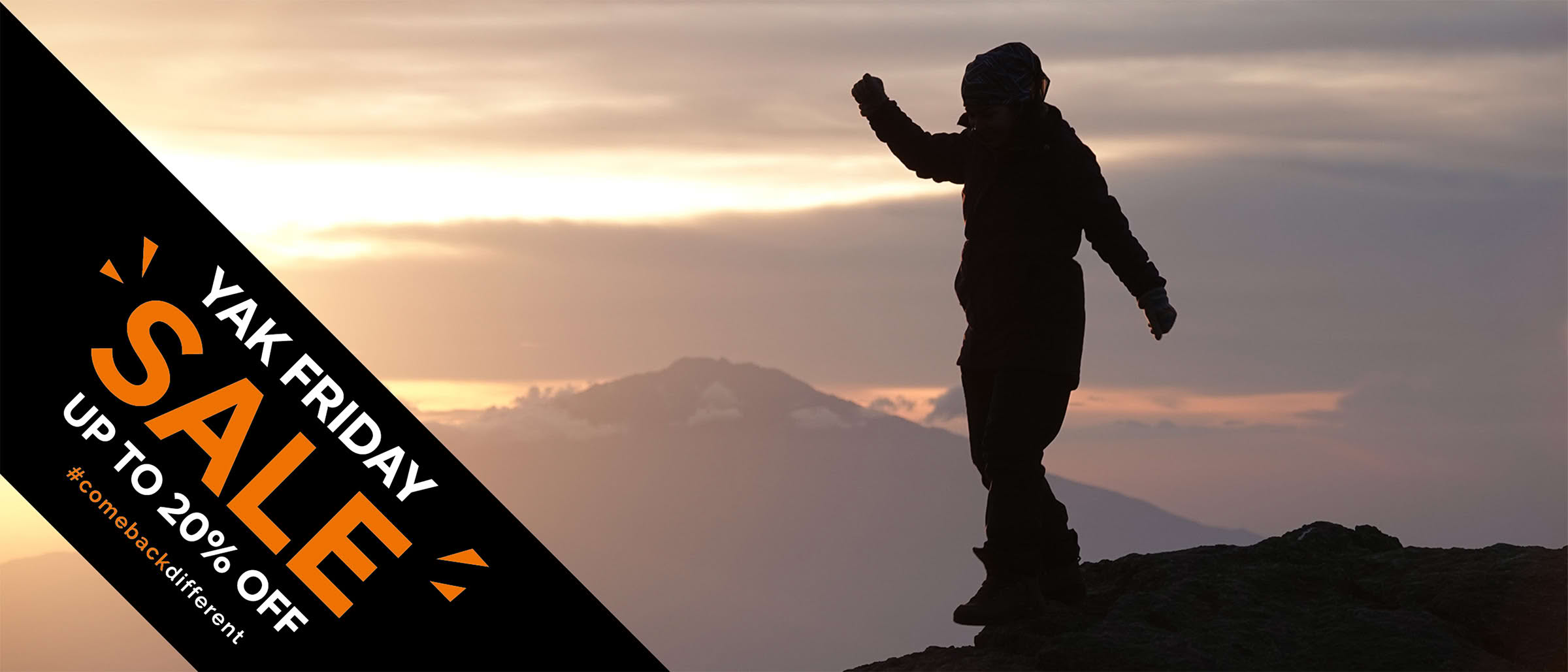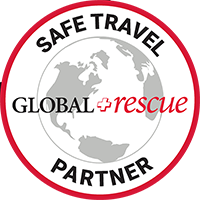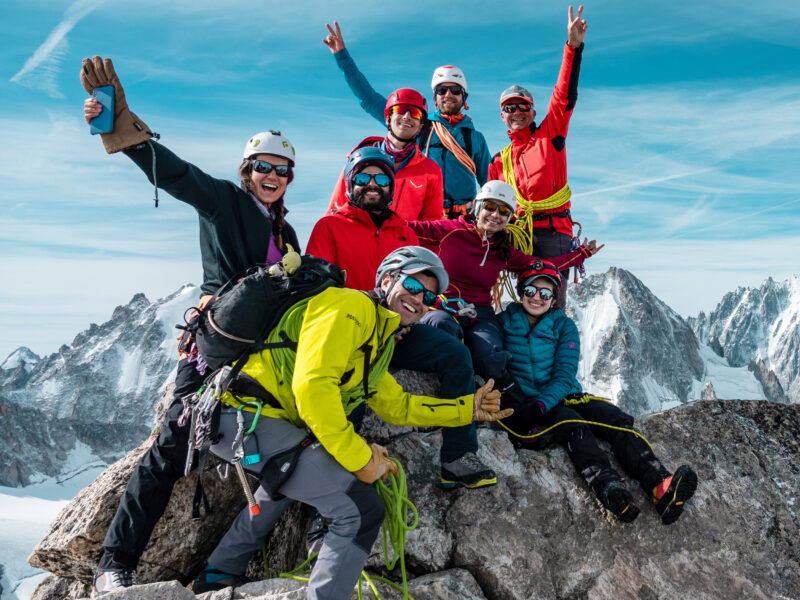BY Rami Rasamny | April 07 2025
The First Timer’s Guide to Climbing Mont Blanc
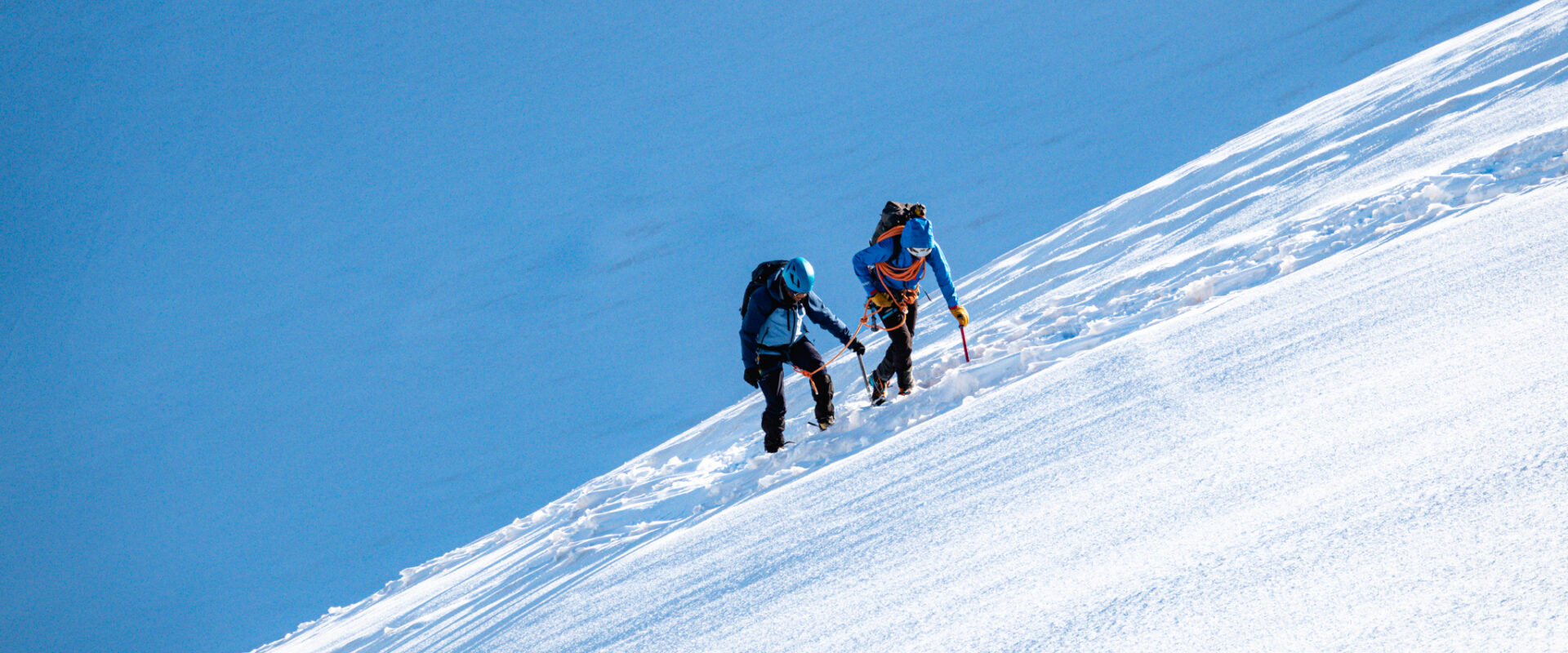
Dreaming of standing on the top of Mont Blanc? You’re not alone. As the highest peak in Western Europe, Mont Blanc is a magnetic challenge for outdoor lovers who want to experience something truly transformative. But if you’re new to mountaineering, you probably have a thousand questions: Is it like Kilimanjaro? Do I need technical skills? What happens if the weather turns? This guide will walk you through everything you need to know before your Mont Blanc mountain climb from mindset to gear to managing risk so you can make the best decision for your adventure.
Trekking vs. Mountaineering: What’s the Difference?
This is one of the first things people get confused about. Trekking typically involves walking on trails without the use of ropes, crampons, or ice axes. Think Tour du Mont Blanc, where you circle the mountain, enjoying breathtaking alpine scenery while sleeping in huts each night.
Mountaineering, on the other hand, involves climbing up glaciated and sometimes steep or exposed terrain. A Mont Blanc climb is firmly in the mountaineering category. You’ll use ropes, crampons, a harness, and an ice axe, and you’ll need to move confidently in snow and ice.
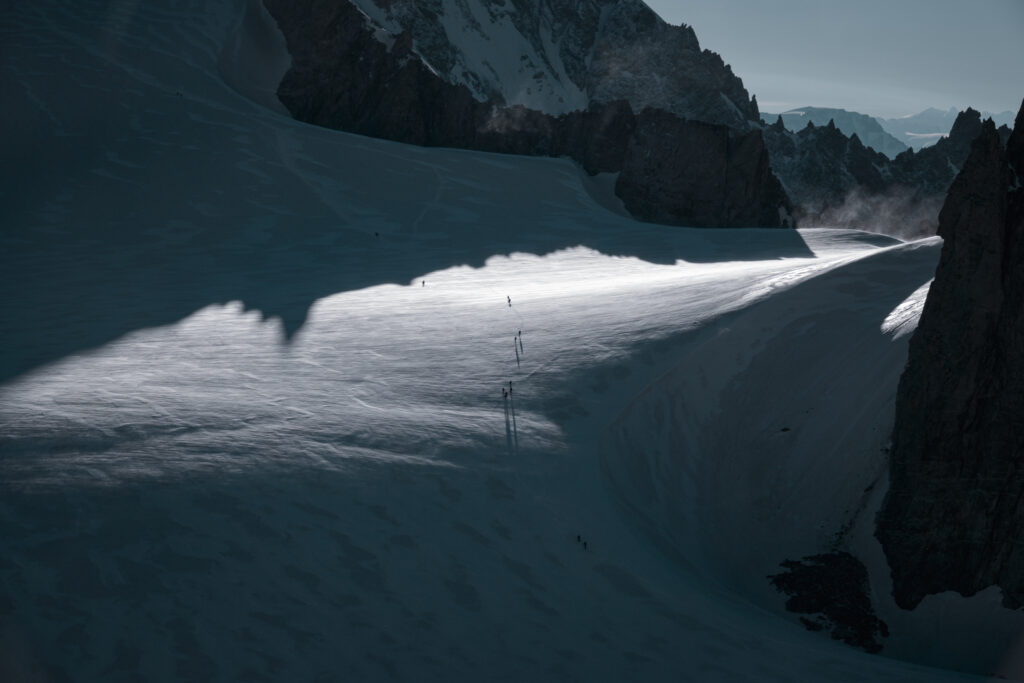
How Climbing Mont Blanc Compares to Kilimanjaro
If you’ve already tackled Kilimanjaro, you might be wondering how it stacks up. Kilimanjaro is a nontechnical trek with altitude as the main challenge. The Mont Blanc summit hike, however, requires not just acclimatisation but also movement across glaciers and potentially exposed ridgelines. Read our full Definitive Guide to Climbing Mont Blanc for a deeper comparison.
While Kilimanjaro tests endurance and altitude adaptation, climbing Mont Blanc tests technical skill, physical fitness, mental resilience, and your ability to adapt to alpine weather conditions.
What Is Technical Gear and How Is It Used?
Technical gear sounds intimidating, but it’s simply the tools that help keep you safe in an alpine environment:
- Crampons: spiked attachments for your boots that provide grip on ice
- Ice axe: used for balance and self arrest in case of a fall
- Harness and rope: essential for glacier travel and crevasse safety
If you join a Mont Blanc guided climb, you’ll be taught how to use all this gear during the first couple of days. Our course is designed for first timers and led by expert IFMGA certified guides who prioritise your learning and safety every step of the way.
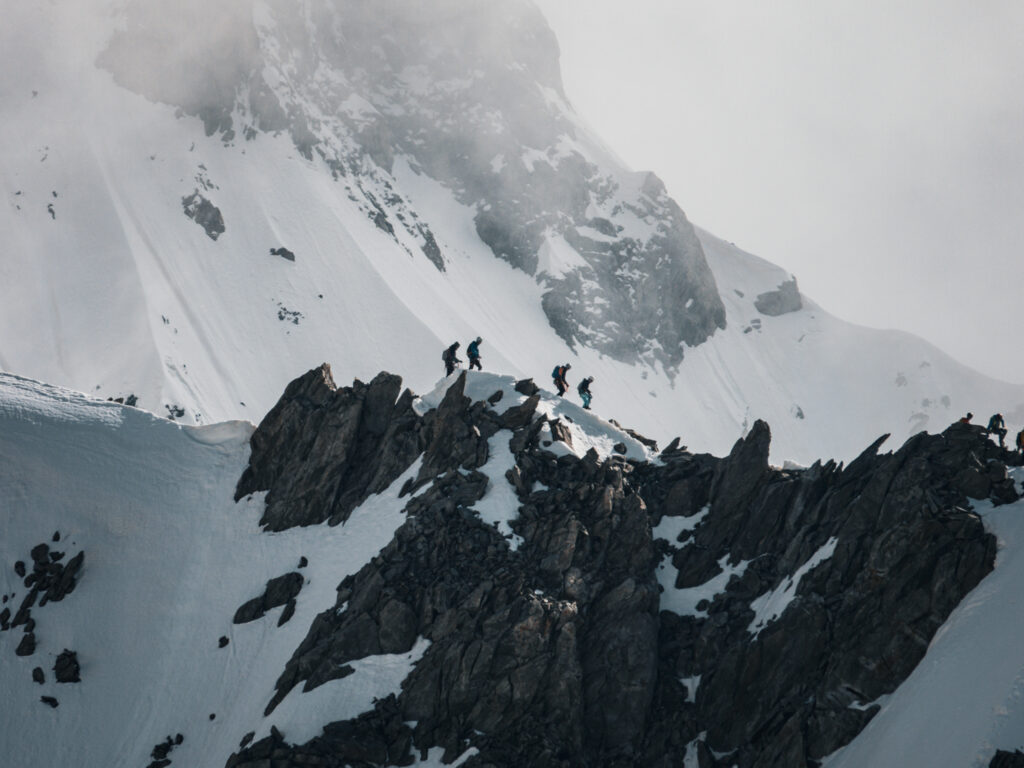
Why Mindset Matters More Than You Think
Your legs may get you to the summit, but your mindset will carry you through the challenges. Weather delays, altitude headaches, early starts, and moments of self doubt are all part of the experience.
Success in Mont Blanc climbing isn’t about brute strength. It’s about staying calm, focused, and open to guidance. Our team at Life Happens Outdoors has built a culture around this, helping you develop the confidence and resilience needed to approach alpinism with the right attitude. As we often say: you’ll come back different.
Weather: The Wildcard of the Alps
Even during a good season, conditions on Mont Blanc can change rapidly. A storm can roll in and shut down access to the summit. Wind and snow can make an otherwise manageable slope dangerous.
That’s why flexibility is key. Our itinerary for the Mont Blanc guided climb is built with buffer days and alternative summit options like Monte Rosa or Weissmies, so your week in the Alps is never wasted even if the mountain has other plans.
Understanding Objective Risks
Unlike controlled environments or well worn trekking paths, the Mont Blanc summit route includes objective hazards like rockfall, crevasses, and sudden weather changes. That’s why climbing with a certified guide isn’t just recommended. It’s essential.
Our guides make real time decisions based on weather, group readiness, and mountain conditions. We don’t take chances. Read more about our risk management approach in our Complete Guide to Climbing Mont Blanc.
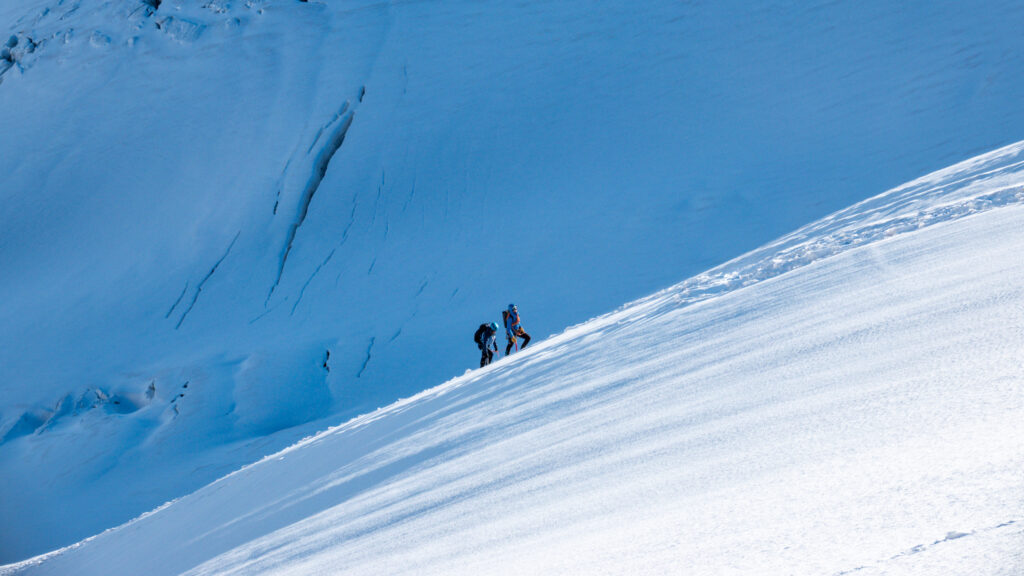
How Difficult Is It to Climb Mont Blanc?
We get asked this all the time: how difficult is it to climb Mont Blanc? The answer depends on your fitness, your attitude, and your willingness to learn. It’s not Everest, but it’s not a walk in the park either.
The Mont Blanc climb difficulty lies in a combination of altitude, technical terrain, and unpredictable conditions. With the right preparation and support, it’s an incredibly achievable goal.
How to Prepare for the Climb
- Train consistently: Focus on cardio, strength, and hiking with a pack
- Book in advance: Hut reservations and guide schedules fill up quickly
- Educate yourself: Read our 10 Tips for Climbing Mont Blanc to get started
- Choose the right trip: Our Mont Blanc mountain climb is curated specifically for first time alpinists
Final Thoughts
If you’re still wondering how to climb Mont Blanc, the best answer is: with guidance, preparation, and humility. Climbing Mont Blanc isn’t just about reaching a summit. It’s about discovering who you become on the way there.
So whether you’re aiming to step onto snow for the first time or seeking a deeper kind of challenge, we’re here to help you make it happen.
Explore our Mont Blanc guided climb and start your journey to the Mont Blanc summit today.
About The Author
Rami Rasamny is the founder of Life Happens Outdoors, a premium adventure travel community dedicated to transforming lives through curated outdoor experiences. A mountaineer and entrepreneur, Rami has led teams on some of the world’s most challenging peaks, from the Alps to the Himalayas. His mission is to make adventure accessible, transformative, and safe for all who seek to push their limits and Come Back Different.
About Life Happens Outdoors
At Life Happens Outdoors, we believe in the power of nature to transform lives. As proud members of the Adventure Travel Trade Association (ATTA) and the World Travel & Tourism Council (WTTC), our team of certified guides and outdoor professionals is committed to the highest standards of safety, sustainability, and excellence.
Discover more about our story and mission on our Meet LHO page, or explore our curated adventures such as the Tour du Mont Blanc Trek, the Climb of Kilimanjaro, and Chasing the Northern Lights.









